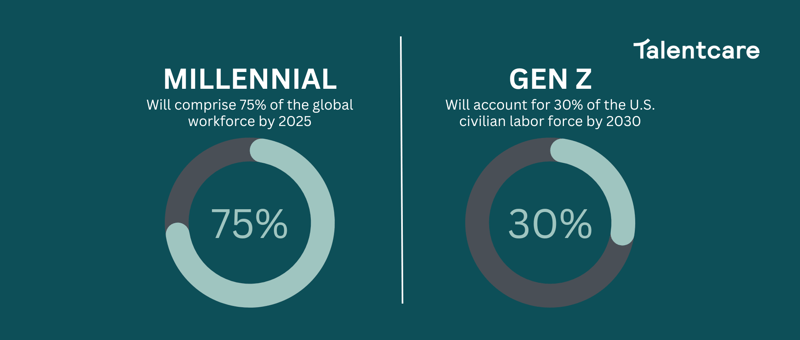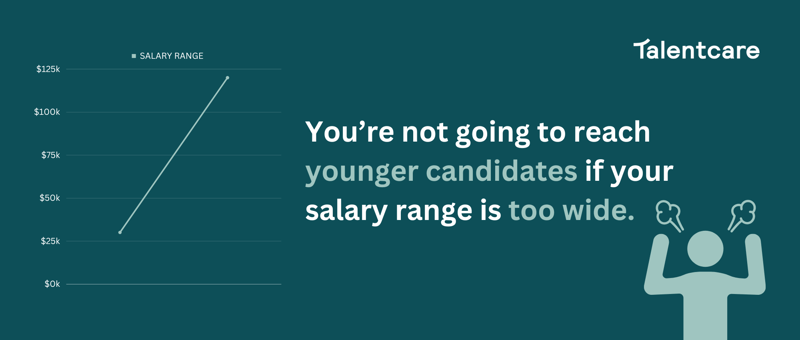Some experts and studies tend to put Millennial and Gen Z candidates in the same category. While there are some similarities, they could apply to any new generation entering the workforce – like Gen X in the 1990s. Is there a difference? Absolutely. Read on.
This year, Millennials will be turning anywhere from 26 to 41 years old (Pew Research). Millennials are already emerging as leaders in technology and other industries and will comprise 75% of the global workforce by 2025, want to work for organizations that foster innovative thinking, develop their skills, and make a positive contribution to society.
This year, Gen Z will turn anywhere from 18 to 25 years old. The U.S. Bureau of Labor Statistics projects that Gen Z will account for 30% of the U.S. civilian labor force by 2030. Gen Z works more jobs, are more likely to be independent workers or contractors, and are more concerned than any other age groups about financial stability (McKinsey).

What they have in common: More than half of U.S. workers — 61% — are considering leaving their jobs in 2023, a new report from LinkedIn has found, noting that a higher percentage of Gen Z and millennial workers are planning to call it quits than any other generation. The main reasons Gen Zers and millennials are considering switching jobs: higher compensation, improved work-life balance, opportunities for career growth and flexible work arrangements all rank as top priorities.
A Recruiting Strategy Thats Appeals Next Gen Candidates
For Boomers (don’t say “OK Boomer” in the office; 40 and over is a protected class and the phrase could be considered ageist) and Gen X (formerly known as “the slacker generation” and currently pulling a lot of weight in leadership roles), recruiting Millennial and Gen Z candidates can be tricky. It’s more than a matter of speaking their language, using emojis, or understanding the #corporatevillainera hashtag on TikTok.

Well, we're here to help you understand! Recruiting Millennial and Gen Z candidates requires a different approach than recruiting other generations. Millennials have a solid footing in the workplace and Gen Z is right behind them. Here are some tips to help you attract and recruit younger candidates.
Your open role is more than a job. Hourly and entry-level roles are opportunities to kick start a career, not just a job. This especially applies to Gen Z, as this generation entered the workforce at the height of a global pandemic and have more fears around financial insecurity. Entry-level roles for small to midsize companies should include opportunities for training, career development, and advancement. For example: You need a part-time front desk specialist at a veterinary practice. Build on-the-job training into your job description, target current college students (even outside of veterinary schools), and ensure that candidates understand that even a part-time role counts towards experience if they are given time on the job to observe and assist.
Keep your salary range narrow. Pay transparency is important and you’re not going to reach younger candidates if your salary range is too wide. Not to state the obvious, but your candidates have access to the internet and they know when a company is trying to dodge pay transparency laws. Here’s just one example after the law was passed in New York: NYC companies post overly broad salary ranges to avoid pay transparency - CBS News. Don’t be that company.

Offer flexible work arrangements and include it in your job posting. Younger candidates value work-life balance and may be more interested in opportunities that offer flexible work arrangements such as remote work or flexible schedules.
Highlight your company’s mission and values. Your reputation matters to all candidates, but younger candidates are more likely to be drawn to companies with a strong sense of purpose and social responsibility.
Make it easy and breezy. Younger candidates are digital natives and are comfortable using technology in all aspects of their lives. Consider using video interviews or virtual job fairs to reach younger candidates (even for on-site roles) and make your application process more streamlined and efficient.
Offer free avocado toast. It's no secret that Millennials and Gen Z love their avocado toast. If you really want to win them over, offer free avocado toast in the break room. Just be prepared for them to Instagram every bite.

OK, the last one is a joke (or is it?), but we do know how to reach next-gen candidates. It’s a big part of what we do at Talentcare (we see it work everyday) and we’re ready to help. Drop us a line or slide into our DMs.
